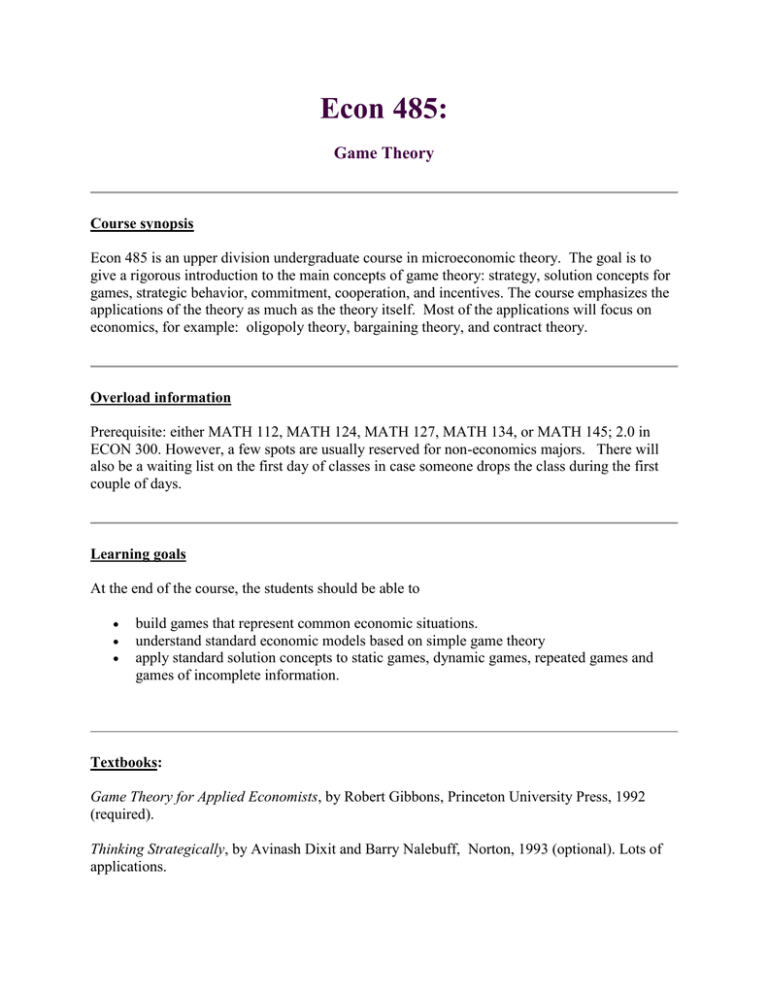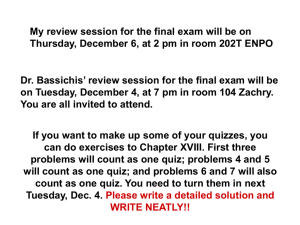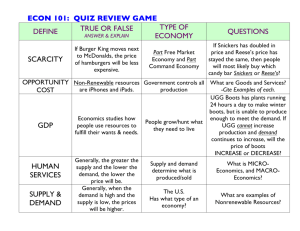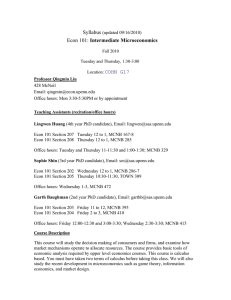Econ 485: Game Theory - Department of Economics
advertisement

Econ 485: Game Theory Course synopsis Econ 485 is an upper division undergraduate course in microeconomic theory. The goal is to give a rigorous introduction to the main concepts of game theory: strategy, solution concepts for games, strategic behavior, commitment, cooperation, and incentives. The course emphasizes the applications of the theory as much as the theory itself. Most of the applications will focus on economics, for example: oligopoly theory, bargaining theory, and contract theory. Overload information Prerequisite: either MATH 112, MATH 124, MATH 127, MATH 134, or MATH 145; 2.0 in ECON 300. However, a few spots are usually reserved for non-economics majors. There will also be a waiting list on the first day of classes in case someone drops the class during the first couple of days. Learning goals At the end of the course, the students should be able to build games that represent common economic situations. understand standard economic models based on simple game theory apply standard solution concepts to static games, dynamic games, repeated games and games of incomplete information. Textbooks: Game Theory for Applied Economists, by Robert Gibbons, Princeton University Press, 1992 (required). Thinking Strategically, by Avinash Dixit and Barry Nalebuff, Norton, 1993 (optional). Lots of applications. Other textbooks: Game theory: An Introduction, by Steve Tadelis, Princeton University Press, 2013. A very good alternative to Gibbons. Games of Strategy, by A. Dixit and S. Skeath, Norton, 1999. A bit "chatty." Game Theory, by Fudenberg and Tirole, MIT Press, 1991. This is the "bible" for game theorists but sometimes challenging to follow. Playing for Real, by Ken Binmore, Oxford Press, 2007. A very good book, all on line: http://offcampus.lib.washington.edu/login?url=http://search.ebscohost.com/login.aspx?direct=tru e&db=nlebk&AN=215244&site=ehost-live Games, Strategies, and Decision Making, Joseph E. Harrington, Jr., Worth Publishing, 2009. Lots of examples from industrial organization. Course Requirements Grades are based on four quizzes, non-graded problem sets (see below) and class participation. Each quiz is cumulative. o o o o The first quiz, worth 15% of the grade, will be on Monday June 30, 2014. The second quiz, worth 20% of the grade, will be on Tuesday July 8, 2014. The third quiz, worth 25% of the grade, will be on Tuesday July 15, 2014. The fourth quiz, worth 30% of the grade, will be on Tuesday July 22, 2014. ( Those dates are subject to change) Your class participation will count for 5% of your grade. The problem sets will also count for 5%. Note that the problem sets will not be graded. The problem sets allow you to check whether you are making good progress in understanding the material. To provide some incentive to do them regularly, I will collect your answers and keep track of who turn them in to assign the 5% of the grade. To receive credit, you must make a good faith attempt to solve ALL problems on the problem sets. This record may also be used in cases of "close decisions" regarding grades. YOU MUST HAVE A SIMPLE CALCULATOR. For the quizzes, only simple calculators will be permitted. A simple calculator performs only basic operations (+,-,*,/) and has no permanent memory ability. No other electronic devices are allowed in class. This includes laptops. If you wonder why, read this article. The Economics department has a policy on academic conduct and academic honesty. Please be familiar with it: http://econ.washington.edu/undergrad/academic_conduct/






